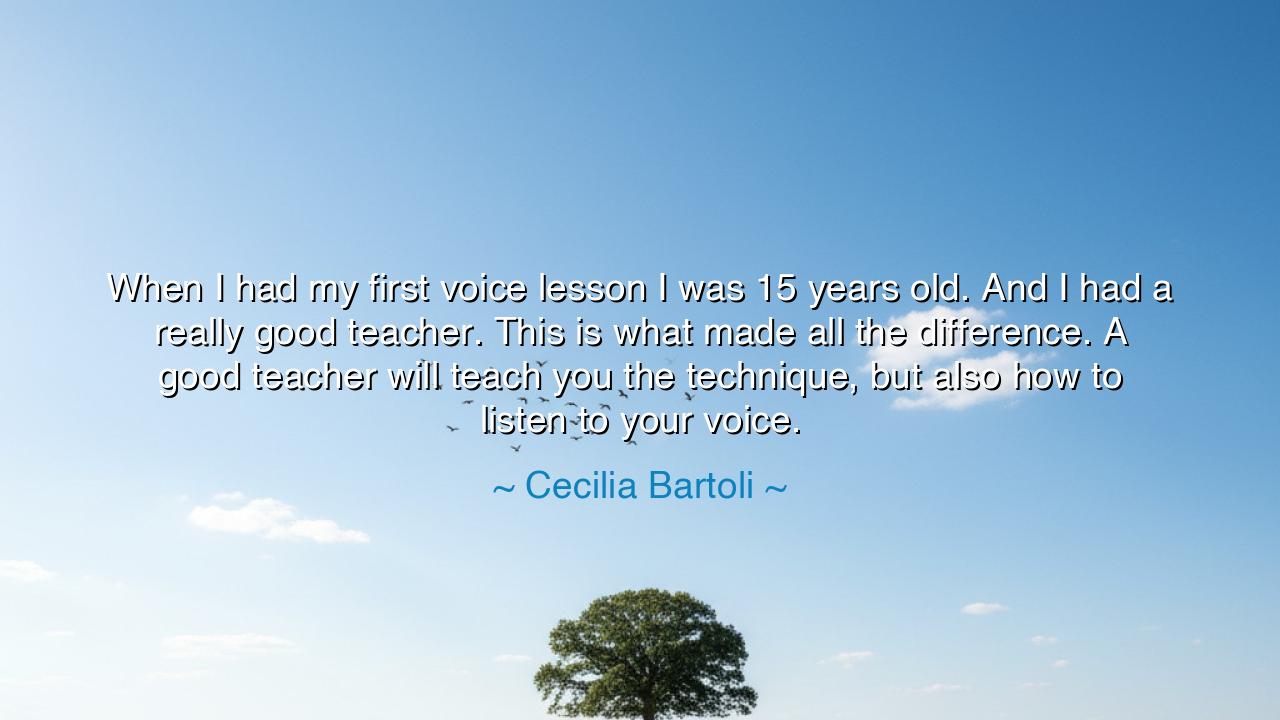
When I had my first voice lesson I was 15 years old. And I had a
When I had my first voice lesson I was 15 years old. And I had a really good teacher. This is what made all the difference. A good teacher will teach you the technique, but also how to listen to your voice.






Hear the words of Cecilia Bartoli, the great songstress of our age: “When I had my first voice lesson I was 15 years old. And I had a really good teacher. This is what made all the difference. A good teacher will teach you the technique, but also how to listen to your voice.” Within this confession lies a truth as old as wisdom itself: that the teacher is not merely a giver of rules, but a guide to the inner ear, the inner eye, the inner self. For knowledge is not only about outward mastery, but about learning to hear what lies within.
To teach technique is to give the student the tools—the scales, the forms, the posture, the breath. These are necessary, for without them no art can stand. Yet Bartoli reminds us that this is not enough. For true mastery comes when the student is taught to listen to their own voice, to hear its subtleties, its colors, its strengths and weaknesses. A teacher does not merely give commands, but awakens awareness. And awareness is the root of all art, the soil from which greatness grows.
This truth has echoed through the ages. Recall Aristotle, who was taught by Plato. From Plato, he did not receive only logic and forms, but the training to examine his own thoughts, to question even his master. Plato gave him the technique of philosophy, but also the courage to hear his own reasoning. Thus Aristotle became more than a vessel of knowledge—he became a thinker in his own right. Just so, Bartoli’s teacher gave her more than exercises; they gave her the ability to listen, to discover her own voice amidst the notes.
We see the same in the story of the painter Raphael, apprenticed in the workshops of Perugino. He learned the brushwork, the lines, the balance of form—that was the technique. But what made Raphael soar beyond his master was that he also learned to see with his own eyes, to perceive beauty not only as his teacher saw it, but as his own soul revealed it. The great teacher does not bind the student to imitation but opens the path to individuality. Bartoli’s words remind us that a teacher must not silence a voice, but unleash it.
Thus, the good teacher is both craftsman and liberator. They shape the student’s skill, but they also train the student to become their own master. Without technique, the voice is wild and untrained; without inner listening, the voice is hollow and false. But when both are united—discipline and self-awareness—the result is artistry, power, and truth. Bartoli did not become who she is by obedience alone, but by learning to hear her own instrument, her own soul.
The lesson for us is clear: seek out teachers who do not only instruct, but who also awaken. If you are a student, do not be satisfied with skill alone; strive also to know yourself, to hear your voice, to see your path. And if you are a teacher, remember that your task is not to make copies of yourself, but to help others discover the unique flame within them. Technique serves the body, but listening serves the spirit. Both are needed, and only then does true greatness emerge.
So I say to you: remember Bartoli’s wisdom. Whatever your craft—be it music, art, speech, or life itself—learn the techniques, yes, but also cultivate the sacred art of listening to your own voice. For within your voice lies not only sound but truth, not only notes but identity. A great teacher helps you find that truth, but it is you who must listen. And when you do, your life will not merely echo others—it will sing with the unmistakable resonance of your own soul.






AAdministratorAdministrator
Welcome, honored guests. Please leave a comment, we will respond soon